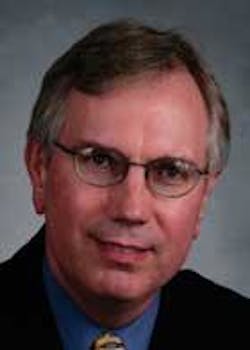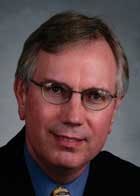Getting accepted into dental school
by Jeffrey B. Dalin, DDS, FACD, FAGD, FICD
Dr. Dalin: When I was applying to dental schools, my father was my advisor. He helped guide me through the process of choosing a school. Frequently, I am asked about applying to dental school. What does it take to get accepted? How do you choose a school? Today we will be be talking about this issue with Dr. Patrick Lloyd, Dean of the University of Minnesota School of Dentistry.
Dr. Lloyd: Year after year, our students tell us how important it was that they had someone in the profession who piqued their interest in dentistry. For some, like you, Jeff, it was a close relative. It could have been a person’s dentist who first talked about the professional rewards and lifestyles of dentists and dentistry as a career. Others might have heard presentations about the profession at high school or college-sponsored programs on career day. They may have talked with a career counselor. Regardless of who was responsible for sparking this interest, having an opportunity to see a dentist in action - interacting with patients, operating a small business, and working collaboratively with a professional staff - is critical to being a successful applicant to dental school.
Each of us has a role in recruiting the next generation of dentists. Private practitioners, dentists involved in public health or the military, and those in dental education and research can help promote the profession by giving prospective students a chance to “experience” what it is like to be a dentist. Inviting them to shadow you in the office, clinic, classroom, or lab is so important in helping someone get admitted to dental school. In fact, it’s actually a requirement for many dental schools, like the one at the University of Minnesota.
However, if you want also to offer these potential dental students advice on how to best present themselves in applying to dental school, you should take time to learn something about the current dental application process. The applicant pool has not been this rich in numbers and quality in more than two decades. Get a sense of what schools expect in GPAs and DAT scores. Find out what other things are being considered by admissions committees. For instance, the University of Minnesota requires that dental school applicants document time showing that they have shadowed someone in the profession.
They also need to show evidence of community service.The best place I believe you can find this information about dental schools is through the American Dental Education Association Official Guide to Dental Schools. For individual schools, check out school Web sites (e.g., www.umn.edu).
Dr. Dalin: I receive inquiries about the dental profession, and what it takes to be accepted into dental school. What do prospective students need to think about while attaining their undergraduate education?
Dr. Lloyd: I would suggest they get an undergraduate education that supports a professional degree. It should be broadly based, covering the sciences and arts. Make sure he or she knows the prerequisite courses for each school of interest and minimum requirements in GPA and DAT scores. They should read dental school academic admission guidelines in school catalogues or school Web sites. To be more competitive and to help in the transition to dental school, many students take coursework above and beyond the prerequisites, such as anatomy, biochemistry, or histology. If the opportunity is there, he or she should make an appointment with someone in the admissions office of the dental school(s) to discuss transcripts and performance. This provides a chance to “get a feel” for how his or her application looks as compared to other applications.
Dr. Dalin: How important is the DAT examination? Is there anything you can recommend to a student preparing for this test?
Dr. Lloyd: At the University of Minnesota, the DAT is a factor early in the application review process. Again, check to see what exam scores are considered competitive at various schools. Some schools also let you know what the class average has been in past years. The test is demanding, and students have to prepare thoroughly to do well. Being a biology major with chemistry courses behind you is not enough. Consider purchasing a review manual or taking one of several commercial preparation courses that are offered.
The DAT score is the single item by which an applicant’s performance is measured in a standardized format. Although it is not the “be-all” and “end-all,” it is an important indicator of an applicant’s academic potential.
Dr. Dalin: Do you have any advice about the application process and the submission of a personal essay?
Dr. Lloyd: We tell students to take the application process seriously. This includes preparing essays. As noted earlier, students should learn all they can about the schools to which they are applying, know what specific and unique requirements each has, and what the emphasis is of each school. This allows students to distinguish themselves from other applicants. They should give it the same consideration they would give a term paper - prepare an outline and write several drafts. They need to work hard to let the admissions committee know what has motivated them to become a dentist, show how their background supports this goal, and explain the special efforts they have made to demonstrate interest and commitment. Essays are important. A good essay can make the difference between being accepted or not so students should spend appropriate time making their case for wanting to join the profession.
Dr. Dalin: Is there anything that practicing dentists should do during the shadowing process? Should we just make these superficial sessions or actually try to teach these prospective students some specifics of what we do in the office?
Dr. Lloyd: A strong orientation to the profession is important. Shadowing experiences are one way to gain this insight. Teaching prospective dental school students the details of the profession should not be the goal of shadowing. It’s better to make sure they get a broad exposure to dentistry. Let them experience interactions with patients and staff, observe patient care chairside, spend some time at the front desk, and learn about the different work and processes that take place behind the scenes. Tell them about the importance of belonging to organized dentistry and what it does for the profession, especially young dentists. Encourage students to visit a variety of offices - general and specialty practices, solo and group practices, and private offices and community clinics. At this early stage, you can even emphasize the value of continuing education and joining study clubs so they can demonstrate they are offering patients the best care the profession has available.
Dr. Dalin: Are interviews done at each dental school? Please talk about this process, and any advice we can give to prospective students to prepare them for these interviews.
Dr. Lloyd: Because the number and quality of applicants is so high, most schools are conducting interviews of qualified candidates. For example, some schools require on-site interviews while others visit with students at undergraduate institutions. Each school conducts interviews differently. Like the essay, the interview is another opportunity for applicants to distinguish themselves from others. Applicants should be prepared to discuss broad topics related to dentistry and health professions. They should be comfortable, and talk openly and honestly about their thoughts and ideas. They should remember that the interviewer might be looking for unique experiences and qualifications, envisioning how each candidate might be of benefit to the school or the profession. If given the opportunity, students can speak to their qualifications in the context of the programs and opportunities offered at a particular school.
Dr. Dalin: Dr. Lloyd, thank you for talking with me. I think our readers of DE will appreciate the information you have offered. Is there anything else you would like to tell our readers?
Dr. Lloyd: In my opinion, there has never been a better time to be a dentist. Patient appreciation for dental treatment is at an all-time high. The evidence dentists have to support the care we provide is well-documented and backed by good science. The public’s trust and confidence in dentistry continue to rank near the top of all professions. The ever-growing connection between oral health and general health has increased the overall value of our services by both the lay and professional publics.
The opportunities in private practice, especially in rural America, are unprecedented. Community clinics have openings across the country. The military and the U.S. Public Health Service are offering training and career options, which they haven’t done in years. For those so inclined, the rewards of being an educator or researcher today are stronger and more exciting than in the past.
I encourage your readers to be loyal and convincing advocates for the profession. They should do all they can to promote the profession in the eyes of future colleagues, whether they be dentists, dental hygienists, assistants, or technicians. We need these people, and we need them to be well informed. Each has a role in ensuring the integrity of the profession and in recruiting a dental workforce that we can all be proud of and willing to support.
Patrick M. Lloyd, DDS, MS is Dean and Professor of Prosthodontics at the University of Minnesota School of Dentistry. His school is taking the lead in simulation technology, has created unique partnerships in the Midwest to promote and finance community-based education, and is recognized for its robust research programs. Information about their curriculum, student body, faculty, facilities, predoctoral application process, and advanced training programs can be found at www.dentistry.umn.edu
Jeffrey B. Dalin, DDS, FACD, FAGD, FICD, practices general dentistry in St. Louis. He is the editor of St. Louis Dentistry magazine, and spokesman and critical-issue-response-team chairman for the Greater St. Louis Dental Society. He is a co-founder of the Give Kids A Smile program. Contact him at [email protected].

